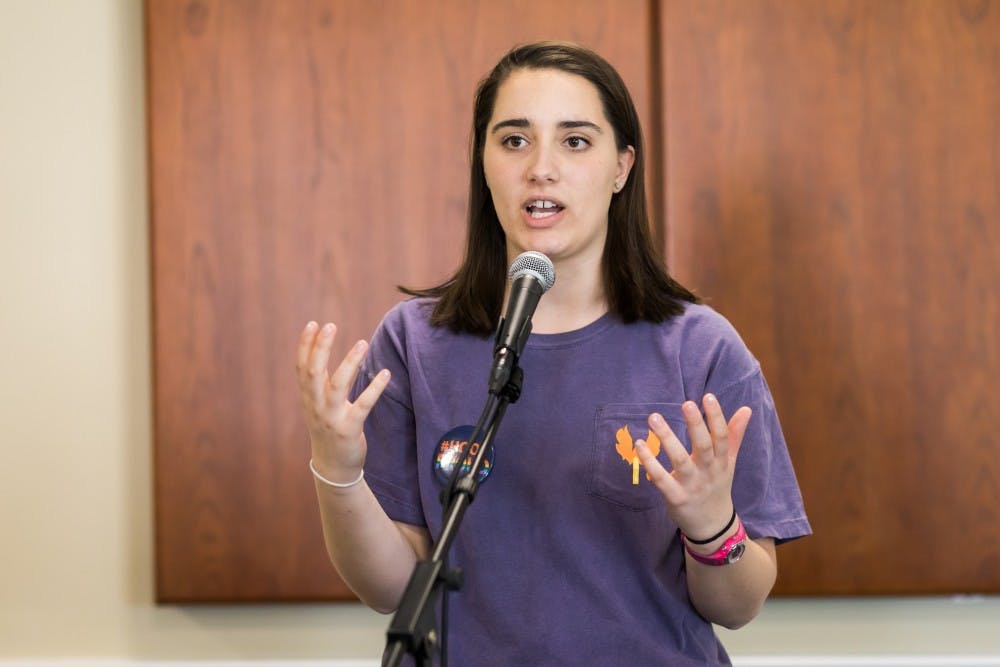Silenced Voices, an event focusing on sexual assault as it pertains to the LGBTQ community, took place Thursday afternoon as part of the month-long Take Back the Night series at the University to raise awareness for sexual assault.
With an almost-full house in the Newcomb Hall Commonwealth Room, the “Silenced Voices” audience was able to listen to Douglas Meyer — an assistant professor in the Department of Women, Gender and Sexuality — and student speakers from the Queer Student Union and First Year Players discuss queer voices and culture as they relate to sexual assault and advocacy.
In addition, the event featured performances by the Harmonious Hoos and complimentary food and drink.
Veronica Sirotic, a second-year College student and the chair of the event, spoke in an interview with The Cavalier Daily about the purpose of the event.
“Basically, we wanted to highlight the fact that in our discussions of sexual assault, queer voices are almost never heard — let alone a queer voice of color,” Sirotic said. “It’s not an easy issue to be tackled, but it needs to be tackled in an intersectional manner.”
Sirotic emphasized the importance of creating a space for an intersectional discussion about sexual assault.
“It’s easy to say like, when you talk about sexual assault, ‘Include a queer voice, a person of color’ — but it’s hard to do that when you don’t have a specific space for it,” Sirotic said. “So, I was fortunate enough to have a forum to bring up prevalent issues without having it be sidelined by something else.”
Sirotic also framed the event as an opportunity to address intersectional issues about sexual assault as they pertain to the University as a whole.
“The queer voice is not heard very often, especially at U.Va,” Sirotic said. “I know that we were recently voted the number one school for the LGBT community in Virginia, but just because we were awarded that doesn’t mean that U.Va. is outspoken about a lot of the policies that hurt queer students. So, I think Take Back the Night was a really wonderful way to express our ideas and issues that are not talked about very often.”
At the event, Sirotic gave the opening remarks, calling on attendees to advocate for their classmates.
“Tomorrow is the ‘Day of Silence,’ which highlights the erasure and the silence experienced by many queer students, especially the queer students at U.Va.,” Sirotic said during the event. “As we listen to speakers … I want each of you to ask yourselves, ‘How am I using my voice for those who cannot?’”
Two representatives from the FYP, a student-run theater organization for first-year students at the University, spoke to the crowd first about sexual assault at the University.
Nolan Reilly, a fourth-year Batten student and last semester’s producer for FYP, addressed the potential for sexual violence in one’s own organization and how to effectively address it.
“No CIO is above scrutiny, and there are still issues that need to be addressed,” Reilly said. “While queer identities are often celebrated in our community, we have also seen some people’s identities reduced to their sexual orientation as a means of belittling what they bring to our community. Many of the queer spaces and traditions we have crafted have been put in place to address these issues and form a safer, stronger community within FYP.”
Erica Comm, a fourth-year College student and a previous technical director for FYP, also spoke about responding to certain cultures of sexual violence on Grounds.
“Clearly, this is an issue that spreads beyond just acceptance and tolerance,” Comm said. “Sexual assault against both queer and straight people in the overall U.Va. environment is a large problem, and we need to combat it. And this is why [we have] events like this where we can listen to oppressed voices that might otherwise be silenced by the severity of an issue.”
Zoey Pettler, a fourth year College student and vice president of education for the QSU, spoke next about how the cultural context for sexual assault needs to evolve.
“Sexual violence is often misunderstood and ignored within LGBTQ communities for a variety of reasons,” Pettler said. “One of the important reasons is that the typical narrative of sexual assault has a man as a perpetrator and a woman as a survivor.”
Pettler also discussed how the University can better address certain issues that the LGBTQ community faces, such as providing better access to gender-neutral housing for first-year students.
“For first-years who identify as genderqueer or transgender, it can be terrifying to live in a gendered hallway,” Pettler said. “These are spaces that are almost completely centered around your gender identity, and for someone who doesn’t fit in to wherever they’re been placed, it’s just a really uncomfortable experience.”
Meyer concluded the event by addressing a wide variety of issues including the dynamics of discrimination and violence based on race, sexuality and gender-conformity, among other topics.
“People have particular ideas and stereotypes about what constitutes sexual assault against queer people,” Meyer said. “So, that’s the first challenge, is to simply break the silence with regard to all these other contexts in which [sexual assault] operates.”
Meyer added there is an inherent added level of danger in how society treats LGBTQ reports of sexual assault.
“When I say that the silence needs to be broken, I don’t necessary view that onus as being on LGBT people ourselves,” Meyer said. “Many queer people can’t tell others because those people will just re-victimize them by blaming them for what happened. My suggestion here is that people who are not LGBTQ need to change how they view sexual [assault] against [queer individuals].”
Meyer finished both his discussion and the event by considering the importance of dialogues about these topics.
“I don’t expect these changes to happen overnight, and they won’t happen unless we make them,” Meyer said. “But it’s these sort of challenging and complex conversations that we need to have.”







